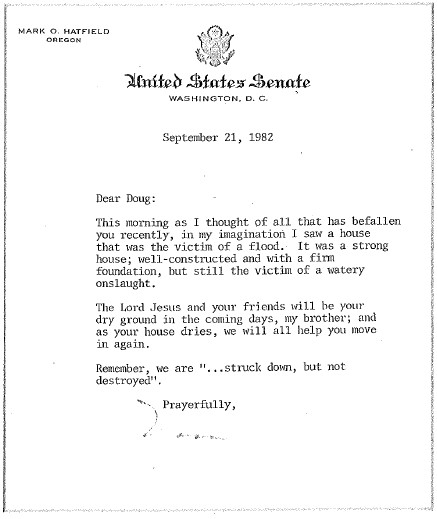By J. Douglas Holladay
Friends.
Legendary slugger Babe Ruth is rightly remembered for his prowess as the all-time home run king. What’s not as well known is his other notable achievement: 1,330 strike outs, by far the most in major league history. In another instance, in 1905, the University of Bern in Switzerland rejected the doctoral dissertation of a young German physics student. They called his work, “irrelevant and fanciful.” Albert Einstein, while bitterly disappointed, was not ultimately defeated.
Our culture has traditionally celebrated great achievement yet has not rightly understood the larger story – the role of pain, defeat, and failure in shaping greatness. Achievement and setback typically walk hand in hand.
Growing up as a young boy, my eyes would often fix upon a framed copy of the Kipling poem, “IF,” on my bedroom wall. My Uncle Bill gave it to me when I turned eight. I recall ruminating over and over Kipling’s two imposters: success and failure. His notion was that neither success nor failure were permanent states that should define us unless we so choose.
An influential mentor of mine, Bankruptcy Court Judge Martin Bostetter, told me of an experience he had in the 70s on a trip to Romania. He was asked to address the parliament on the merits of US bankruptcy law. Unlike our nation, countries like Romania criminalized bankruptcy, providing NO second chances. If you failed in business, your life was over. Judge Bostetter illustrated his point by placing a shiny, silver-wrapped Hershey Chocolate Kiss on the desk of each member. The parliamentarians “bemusement” turned to “Ah-ha” when Bostetter explained Milton Hershey’s business history. Hershey had suffered colossal business failures but eventually scored big in chocolate. America’s bankruptcy laws enabled him to begin anew, eventually creating significant wealth which he generously channeled towards the public good.
Failure need not define us. Thank God, it’s not the entire story.
We want our leaders to be different from us; smarter, more eloquent, problem-free, and perfect in most regards. When they evidence their clay feet, we are outraged and disappointed. Yet, in our gut we know that the heart is more important than externalities and humility more than pride. This turns the success ethic on its head. Humility, failure, heartache, and ‘moral bankruptcy’ are often doorways to great achievement. Deep down we all know we are frauds – weak, envious, lustful, and selfish, utterly undeserving of great acclaim.
Most of us at some point in our lives come face to face with a circumstance that flattens us. We are discouraged, hopeless, and wondering if there is a way forward. And while some never move beyond such searing setbacks, others like Einstein do. How must Thomas Carlyle have felt after lending his manuscript, The French Revolution, to a close friend only to find that his friend’s servant had carelessly used its pages to kindle a fire? Carlyle calmly went about rewriting his epic work. Henry Ford failed and went broke five times before finally succeeding. Or consider Dr. Seuss whose initial children’s book, And to Think I Saw it on Mulberry Street, was rejected by 27 publishers. The 28th, Vanguard Press, sold 6 million copies of the book.
What can appear to be the end can actually be the launch pad of great achievement. Such blurring of failure and success is all deeply embedded in our world’s history. Authenticity and need rather than posing to be invulnerable and secure is true strength.
So, if you find yourself at the end of your tether, take heart, it might actually be the ‘pregnant pause’ before giving birth to the amazing possibilities that await.
Warmly,
Doug

